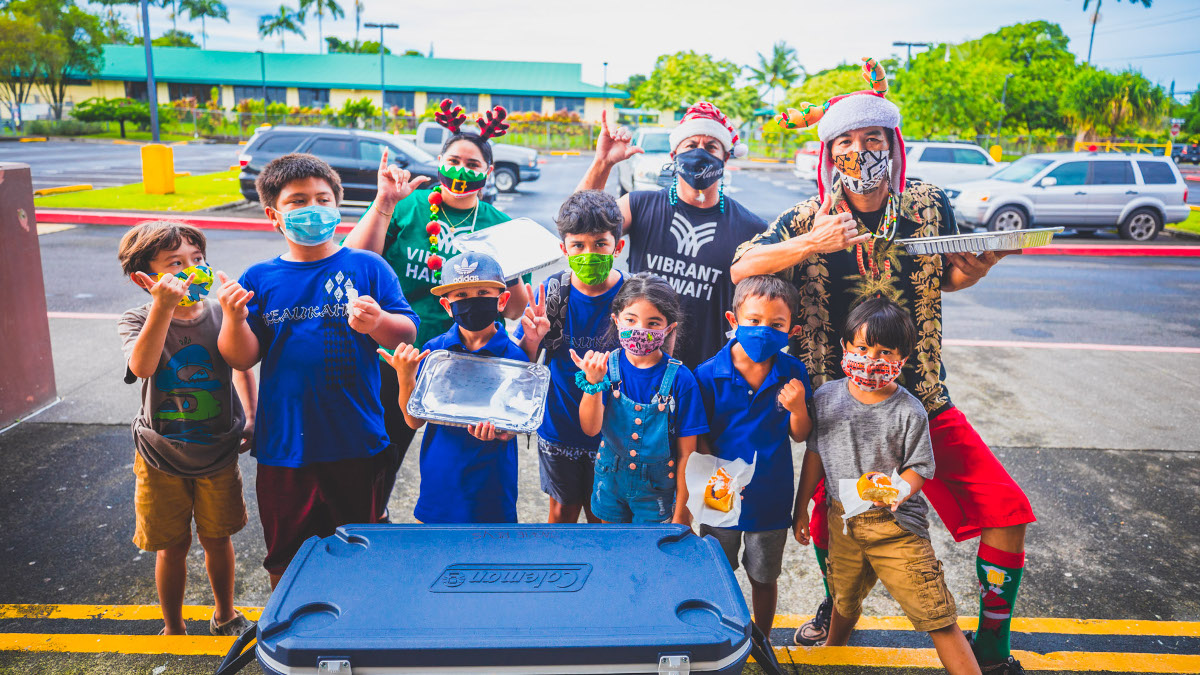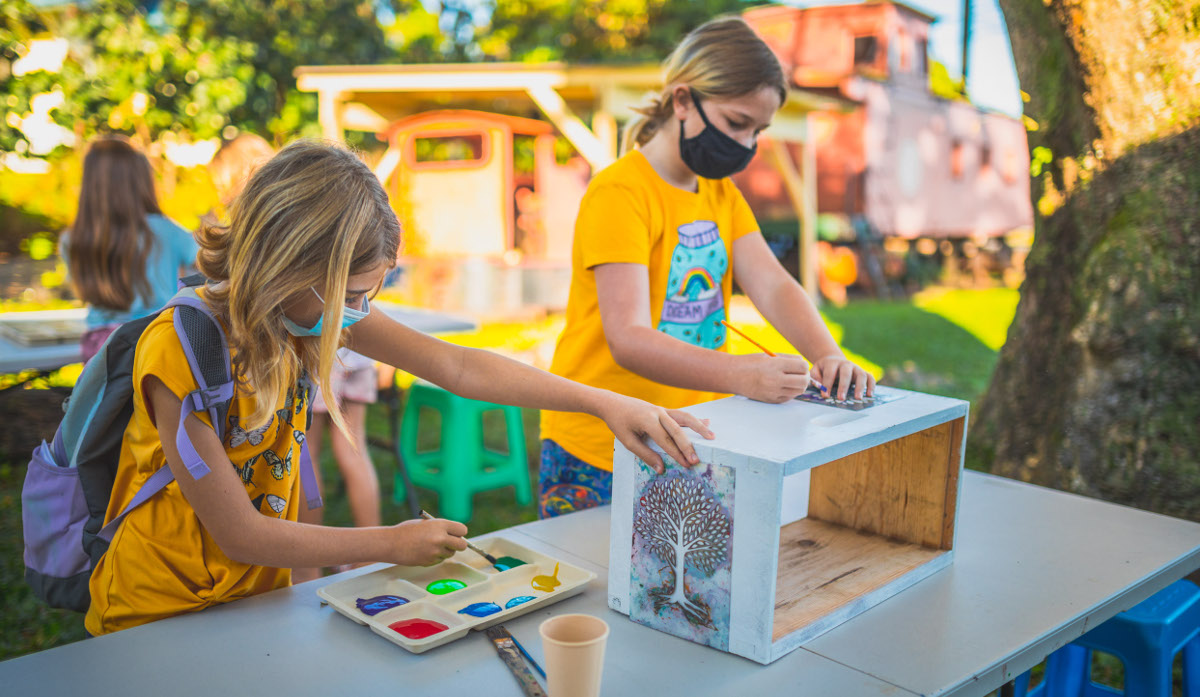(BIVN) – The second phase of the Resilience Hubs initiative has been launched on Hawaiʻi island. This news release is from Vibrant Hawaiʻi:
Vibrant Hawai‘i, a collective impact initiative that convenes organizations and community stakeholders across all sectors to come together in collaboration to build strategy based action plans around housing, economy, education, health, and financial resilience, has launched its second phase of Resilience Hubs. As these hubs played a critical role in helping communities during the COVID-19 pandemic, the next phase would expand their commitment to support our communities post pandemic.
Through a generous donation from Kohala Coast residents, 20 community Resilience Hubs around Hawai‘i Island are powering on from February through May 2021 with a projected reach of nearly 3,000 individuals each week.
“Resilience Hubs are a demonstration of what we believe”, said Janice Ikeda, Executive Director of Vibrant Hawaiʻi. “Everyone is useful and everyone contributes to collective resilience, abundance, and to our community’s vision of a vibrant Hawaiʻi. This project would not be possible without the generous investment from a small group of Kohala Coast residents, and it would also not be possible without partnerships with local government, small businesses and restaurants who provide meals, and community champions who open the doors of the hubs every week. ”
Resilience Hubs are trusted, people-powered venues that support residents, adapting to changing needs and activating in times of disaster to support emergency response and recovery efforts. Hubs are a strategy and action of Vibrant Hawai‘i’s Economy Stream.
Resilience Hubs were first launched September to December 2019 in more than 30 communities around the island to deliver assistance in response to COVID-19. Over the 16 week activation, nearly 41,733 households and 108,214 individuals (38 percent under age 18) were assisted. Originally made possible by CARES funding granted by the County, Resilience Hubs provided a safe learning space for keiki, community access to WiFi and laptops, and restaurant-prepared meals and produce bags.
Phase II of the Resilience Hubs initiative builds on the initial activation and primes community partners with a suite of tools, resources, and mentorship to assist residents, revitalize the economy, and build capacity and infrastructure so communities are ready for anything.
According to the Vibrant Hawaiʻi news release, these communities are in the Hubs 2.0 network:
- Hāmākua: Honomū Gym, Pāpa‘ikou Gym, Hāmākua Youth Foundation, Pōhāha I Ka Lani
- East Hawai‘i: Island of Hawai‘i YMCA, Kawananakoa Gym, Pana‘ewa Farmers Market, UH Hilo, Waiākea Uka Gym
- Puna: Leilani Estates Neighborhood Watch, Men of Pa‘a x Kanaka O Puna
- Ka‘ū: Nā‘ālehu Hongwanji x O Ka‘ū Kākou, Pāhala Resilience Hub
- Kohala: Kailapa Community Association, Feed Hawaiʻi, Overflow Church x Partners in Development, St. James Church, Waimea District Park
- West Hawai‘i: Kama‘aina Hale Apartments, Miloli‘i Kōkua Hub
From the news release:
In addition to providing up-to-date information related to COVID-19 mitigation, Hubs will provide resources to soften the financial, emotional, and social impact of the pandemic. Resilience Hubs will increase access to internet in neighborhoods that currently have poor to no service/signal through WiFi connections; be a support for children’s required learning and enrichment; be a space for emergency food distributions; and serve as a hub of resources for various public/private assistance programs including Financial Empowerment Centers, Navigation Programs, and Digital Literacy.
To foster economic resilience, Hubs have committed to pilot an economic development initiative in one of the following areas: ʻĀina Based Learning, Sustainable and Community Driven Tourism, Health and Wellness, Resilient Food Systems, Creative and Performing Arts, and Technology and Creative Media. To advance their initiatives, Vibrant Hawai‘i has engaged industry experts to mentor Hubs in their area of focus in order to establish proof-of-concept and create a functioning prototype with pathways for the project to scale up. To this end, retired and active professionals also volunteer their time to support fellow islanders and surrounding communities.
To increase food resilience, Vibrant Hawai‘i has partnered with the Honeybee Education Program to institute a Pay-it-Forward community garden initiative at each Resilience Hub. Community members as well as ‘ohana who pick up a produce bag or restaurant prepared meal will be encouraged to volunteer in the garden to further cultivate individual/community resilience as well as an abundance and reciprocity mindset.
Pono placemaking support will be provided to Hubs pursuing community-driven tourism initiatives that support the local economy, protect natural and cultural resources, and better connect people to the island. To support the arts, local artists will curate pop-up experiences to expose community and keiki to various art mediums to foster health and well-being and showcase the stories and uniqueness of each region of Hawai‘i Island.
“Each Resilience Hub is designed and driven by community,” said Ashley Kierkiewicz, Vibrant Hawaii’s Economy Stream Chair. “By putting power into people’s hands, we are building a strong, purposeful network of resilience so the community is able to meet changing needs and address challenges with creativity, empathy, and aloha. We are grateful for the private donations which allow us to keep building upon the foundation we established at the onset of the pandemic.”
To further and deepen the work of Hubs 2.0 partners, Vibrant Hawai‘i launched a Resilience Leadership Academy, a four part series geared towards building individual capacity and community networks. The RLA is conducted 2nd Thursdays, February to May, from 9am to noon via Zoom. Details and registration at vibranthawaii.org/get-involved.



by Big Island Video News7:43 am
on at
STORY SUMMARY
HAWAIʻI ISLAND - The initiative will focus on "building human and social capital, and developing resilient economic sectors", project representatives say.